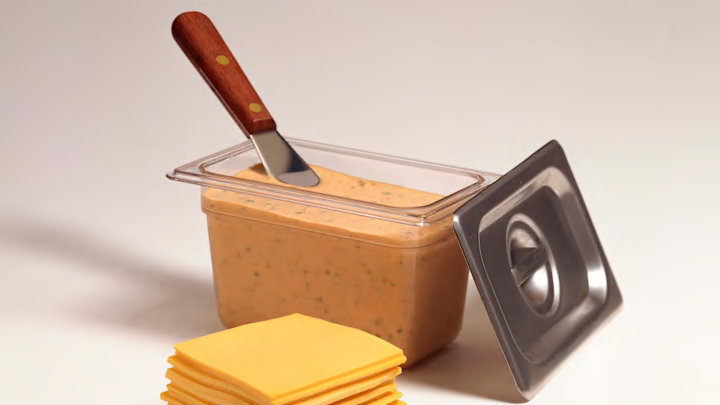Secrets in the world of fast food don’t alway stay secret for very long. In-N-Out Burger’s off-menu “animal style” option is hardly exclusive, and neither is the knowledge that their famous spread amounts to Thousand Island dressing. McDonald’s initially kept the ingredients of the Big Mac’s secret sauce vague, but they’ve since revealed the contents to be mayonnaise, relish, vinegar, spices, and sweeteners—which is basically a riff on Thousand Island without the tomato. Though the official name is rarely used on menus, the creamy, orange condiment’s history with hamburgers is common knowledge. What’s more mysterious is how a salad dressing became a fast food staple in the first place.
Thousand Island dressing has inspired confusion since its inception. It’s named after the real-life Thousand Islands—an archipelago on the St. Lawrence River between New York and Canada that attracted many wealthy vacationers during the Gilded Age. The exact inventor is disputed, as are the traditional ingredients. The dressing always starts with a mayonnaise base, and additions like ketchup, pickle relish, mustard, Worcestershire sauce, and Tabasco are generally accepted as common components. The result is a creamy, tangy, pale orange sauce with a hint of crunch.
Though food historians can’t agree on who made it, the reason for its popularity is clear. The leafy greens native to New York tend to be more bitter varieties like endives and chicories. Around the turn of the 20th century, chefs in the region started using rich mayonnaise-based dressings to balance these flavors.
So how did Thousand Island make the jump from salads to burgers? The Reuben sandwich was likely the bridge between these two dishes. Much like Thousand Island dressing, the Reuben—which traditionally consists of corned beef, Swiss cheese, sauerkraut, and Thousand Island or Russian dressing (which is just a spicier version of Thousand Island) on rye bread—has a murky history. The popular legend traces its origins to Omaha, Nebraska, while some historians say it was invented in New York. Either way, it was an early example of a tangy, creamy salad dressing appearing on a meaty sandwich, and it had become a deli staple by the mid-20th century. Without the Reuben, fast food restaurants may have never been inspired to take a similar approach with their burgers.
McDonald’s has the best known secret sauce, but multiple chains came up with something similar first. In 1961, the west coast chain In-N-Out started serving “animal style” burgers with an extra helping of their spread—a sauce made from ketchup, mayo, relish, sugar, and vinegar. When McDonald’s introduced the Big Mac six years later, franchise owner Jim Delligatti modeled the formula after another burger chain: Big Boy. The restaurant’s signature sandwich came with a so-called “famous sauce” that also contained mayonnaise, ketchup, and relish, as well as chili.
McDonald’s wasn’t the first chain to add a Thousand Island-inspired condiment to their burgers, but their decision to label it “secret sauce” in early advertisements kicked off a nationwide trend. Shortly after the Big Mac’s debut, Jack in the Box introduced a new burger with its own secret sauce made from ketchup, mayo, mustard, steak sauce, Worcestershire sauce, and hot sauce. Today, Shake Shack’s shack sauce and Steak and Shake’s Frisco sauce also take inspiration from Thousand Island dressing.
In addition to following industry trends, there are other reasons so many restaurants have embraced an old-school salad dressing as their burger sauce. One is convenience. The sauce has been deemed special, but the ingredients that go into it are as basic as it gets. The popular condiments that make up the classic dressing can be found in the kitchens of most diners and burger joints across America.
Another reason for its ubiquity is its winning flavor profile. As Rob Bricken wrote for MEL Magazine, Thousand Island is the “perfect condiment” that can be “used just about anywhere ketchup, mustard or mayonnaise is used to delicious effect.” Rather than choosing between the richness of mayo, the tang of ketchup, the bite of mustard and hot sauce, and the sweet and sour combination of relish, Thousand Island can combine all of the above. It may not be as interesting or exotic as its mysterious reputation suggests, but the sauce has earned its place in fast food history.
